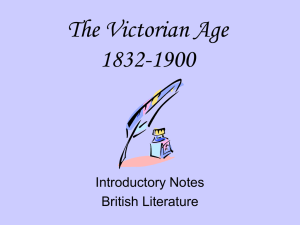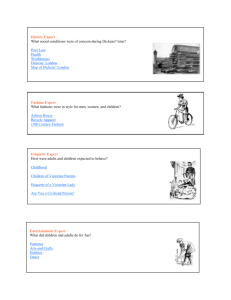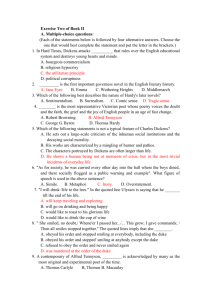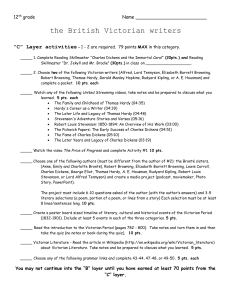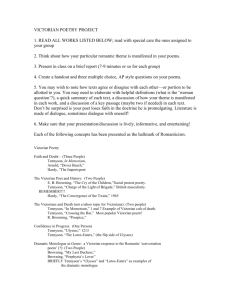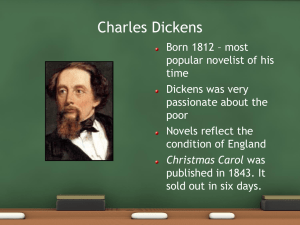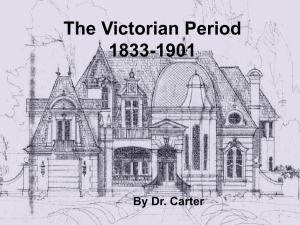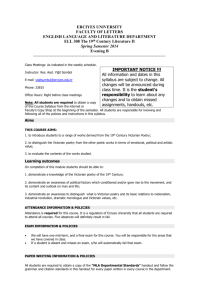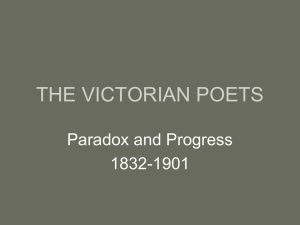Victorian Literature Exercise: Dickens, Hardy, Bronte
advertisement
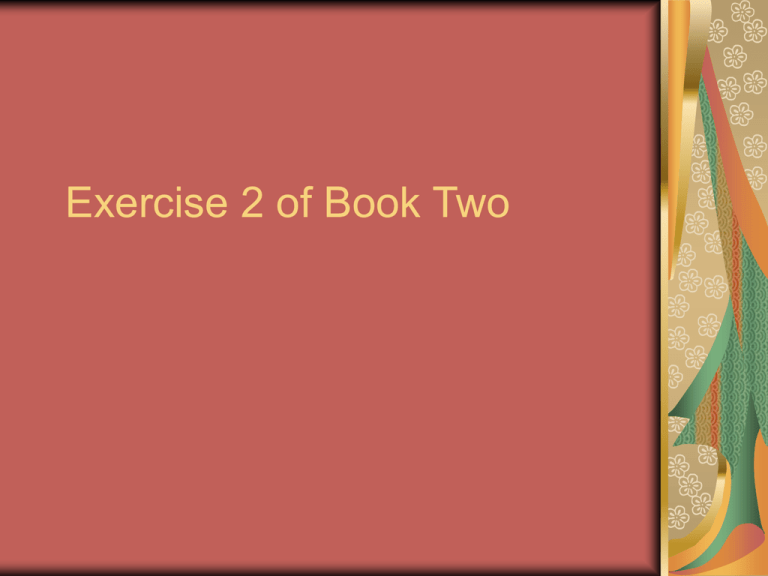
Exercise 2 of Book Two A. Multiple-choice questions: (Each of the statements below is followed by four alternative answers. Choose the one that would best complete the statement and put the letter in the brackets.) 1. In Hard Times, Dickens attacks __________ that rules over the English educational system and destroys young hearts and minds. A. bourgeois commercialism B. religious hypocrisy C. the utilitarian principle D. political corruptness 2. _________ is the first important governess novel in the English literary history. A. Jane Eyre B. Emma C. Wuthering Heights D. Middlemarch 3. Which of the following best describes the nature of Hardy's later novels? A. Sentimentalism. B. Surrealism. C. Comic sense. D. Tragic sense. 4. ________ is the most representative Victorian poet whose poetry voices the doubt and the faith, the grief and the joy of English people in an age of fast change. A. Robert Browning B. Alfred Tennyson C. George G. Byron D. Thomas Hardy 5. Which of the following statements is not a typical feature of Charles Dickens? A. He sets out a large-scale criticism of the inhuman social institutions and the decaying social morality. B. His works are characterized by a mingling of humor and pathos. C. The characters portrayed by Dickens are often larger than life. D. He shows a human being not at moments of crisis, but in the most trivial incidents of everyday life. 6. "As for society, he was carried every other day into the hall where the boys dined, and there socially flogged as a public warning and example". What figure of speech is used in the above sentence? A. Simile. B. Metaphor. C. Irony. D. Overstatement. 7. "I will drink /life to the lees." In the quoted line Ulysses is saying that he _______ till the end of his life. A. will keep traveling and exploring B. will go on drinking and being happy C. would like to toast to his glorious life D. would like to drink the cup of wine 8. " She smiled, no doubt,/ Whene'er I passed her.../... This grew; I gave commands; / Then all smiles stopped together." The quoted lines imply that she ________. A. obeyed his order and stopped smiling at everybody, including the duke B. obeyed his order and stopped' smiling at anybody except the duke C. refused to obey the order and never smiled again D. was murdered at the order of the duke 9. A contemporary of Alfred Tennyson, _________ is acknowledged by many as the most original and experimental poet of the time. A. Thomas Carlyle B, Thomas B. Macaulay C. Robert Browning D.T.S. Eliot 10. Most of Hardy's novels are set in ________, the fictional primitive and crude rural region that is really the home place he both loves and hates. A. Yorkshire B. Wessex C. London D. Manchester 11. "The floating pollen seemed to be his notes made visible, and the dampness of the garden the weeping of the garden's sensibility." The quoted sentence is suggestive of __________. A. the richness of the music in the garden B. the beauty of the scenery in the garden C. the great power of the music in affecting the environment D. the harmony and oneness of the music, the garden and the heroine Tess 12. In the statement "--oh, God! would you like to live with your soul in the grave?" the term "soul" apparently refers to _________. A. Heathcliff himself B. Catherine C. one's spiritual life D. one's ghost 13. "I have talked, face to face, with what I reverence; with what I delight in-with an original, a vigorous, an expanded mind." Here in the quoted passage, Jane is really saying that she has talked face to face with __________. A. God who appears in her dreams B. the reverent priest C. Mr. Rochester D. Miss Ingrain 14. In the clause "As Mr. Gamfield did happen to labor under the slight imputation of having bruised three or four boys to death already... ", the word "slight" is used as a(n) _______________. A. simile B. metaphor C. irony D. overstatement 15. Dickens takes the French Revolution as the background of the novel ______ . A. Great Expectations B. A Tale of Two Cities C. Bleak House D. Oliver Twist 16. The Victorian Age was largely an age of ___________, eminently represented by Dickens and Thackeray. A. poetry B. drama C. prose D. epic prose 17. The title of Alfred Tennyson's poem "Ulysses" reminds the reader of the following except ____________. A. the Trojan War B. Homer C. quest D. Christ 18. The character Rochester in Jane Eyre can be well termed as a _________. A. conventional hero B. Byronic hero C. chivalrous aristocrat D. Homeric hero 19. Mr. Micawber in David Copperfield and Sam Well in Pickwick Paper are perhaps the best _________ characters created by Charles Dickens. A. comical B. tragic C. round D. sophisticated 20. The typical feature of Robert Browning's poetry is the _________. A. bitter satire B. larger-than-life caricature C. Latinized diction D. dramatic monologue 21. In Tess of the D'Urbervilles, Thomas Hardy resolutely makes a seduced girl his heroine, which dearly demonstrates the author's _________ of the Victorian moral standards. A. blind fondness B. total acceptance C. deep understanding D. mounting defiance 22. In Hardy's Tess of the D’Urbervilles, the heroine's tragic ending is due to ______. A. her weak character B. her ambition C. Angel Clare's selfishness D. a hostile society 23. "The dehumanizing workhouse system and the dark, criminal underworld life" are the right words to sum up the main theme of ________. A. David Copperfield B. A Tale of Two Cities C. Oliver Twist D. Bleak House 24. "For a week after the commission of the impious and profane offence of asking for more, Oliver remained a close prisoner in the dark and solitary room to which he had been consigned by the wisdom and mercy of the board. " In the above passage quoted from Oliver Twist, Dickens uses the words "wisdom" and "mercy" ________. A. ironically B. carelessly C. nonchalantly D. impartially 25. "... and then how they met I hardly saw, but Catherine made a spring, and he caught her, and they were locked in an embrace ..." In the quoted passage, Emily Bronte tells the story in __________ point of view. A. first person B. second person C. third person limited D. third person omniscient B. Blank-filling: (Complete each of the following statements with proper words or phrases.) 1. Dickens' best-depicted characters are those innocent, virtuous, helpless ________ characters, those horrible and grotesque characters and those broadly humorous or ________ ones. child comical 2. Charlotte Bronte's works are famous for the depiction of the life of the middle-class working women, particularly ________. governess 3. Wuthering Heights is the ________ novel written by Emily Bronte. only 4. A contemporary of Alfred Tennyson, ________ is acknowledged by many as the most original and experimental poet of the time. Robert Browning 5. ________, Tennyson's greatest work, is presumably an elegy on the death of a dear friend. In Memoriam 6. In her study of human life, George Eliot paid particular attention to the relationship between the individual personality and the ______. social environment 7. Thomas Hardy is often regarded as a ________ writer, in whose works we see the influence from both the past and the present, both the traditional and the modern. transitional 8. The major novelists of the Victorian period made bitter and strong _______ of the inhuman social institutions and the decaying social morality. criticism 9. The Victorian Age in English literature was largely an age of prose, especially of the ________. novel 10. The typical feature of Robert Browning's poetry is the _______. dramatic monologue Define the literary terms listed below: 1. George Eliot's determinism 2. Chartist Movement 3. Dramatic Monologue 4. Naturalism Reading comprehension: (For each of the quotations listed below please give the name of the author and the title of the literary work from which it is taken and then briefly interpret it.) 1. "Let it not be supposed by the enemies of 'the system', that during the period of his solitary incarceration, Oliver was denied the benefit of exercise, the pleasure of society, or the advantages of religious consolation." 2. "Do you think, because I am poor, obscure, plain and little, I am soulless and heartless? --You think wrong! --I have as much soul as you--and full as much heart... I am not talking to you now through the medium of custom, conventionalities, or even of mortal flesh:--it is my spirit that addresses your spirit; just as if both had passed through the grave, and we stood at God's feet, equal--as we are!" 3. "He flung himself into the nearest seat, and on my approaching hurriedly to ascertain if she had fainted, he gnashed at me, and foamed like a mad dog, and gathered her to him with greedy jealousy. I did not feel as if I were in the company of a creature of my own species..." 4. "Tho'/We are not now that strength which in old days/Moved earth and heaven; that which we are, we are;/One equal temper of heroic hearts, /Made weak by time and fate, but strong in will/To strive, to seek, to find, and not to yield." 5. "Marriage, which was to bring guidance into worthy and imperative occupation, had not yet freed her from the gentlewoman's oppressive liberty; it had not even filled her leisure with the ruminant joy of unchecked tenderness.“ 6. "I repeat, /The Count your master's known munificence/Is ample warrant that no just pretense/Of mine for dowry will be disallowed; /Though his fair daughter's self, as I avowed/As starting, is my object." Essay questions : (In this part you are asked to write a short essay on each of the given topics. You should write no more than 150 words on each one. Therefore, you should concentrate on those most important points, try your best to be logical in your essay, and keep your writing clear and tidy.) 1. Comment on the superb description of the extraordinary passion between Catherine and Heathcliff in the selected reading. 2. Read the poem "Break, Break, Break" and comment on Tennyson's poetic art. 3. Comment the theme(s) of Charlotte Bronte's Jane Eyre. 4. Comment on the use of dramatic monologue in "My Last Duchess".
